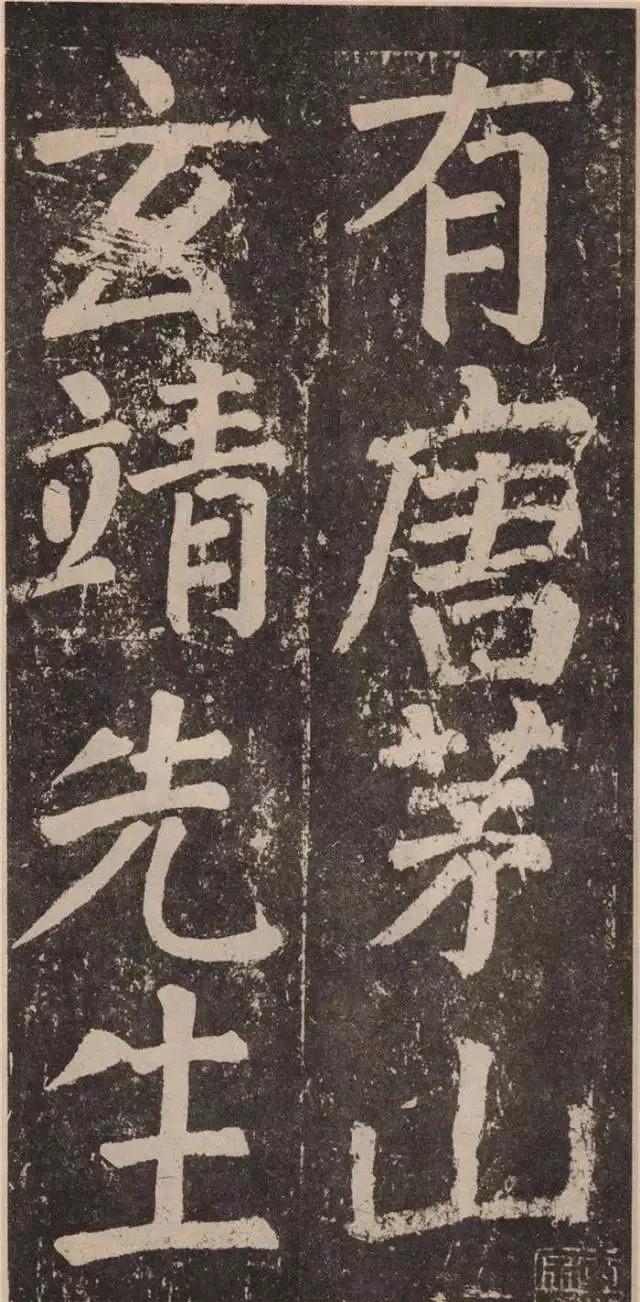
In the second year of Qianyuan (759), when Yan Zhenqing was appointed as the assassin of Shengzhou, he sent a letter to Maoshan to confess his heart of "Mu Dao Xuanwei". Li Hanguang instructed Wei Jingzhao to answer. Although Yan Zhenqing originally had the heart of a home in the mountains and forests, he eventually became "obedient to his long-cherished wishes, wandering in the county, and empty of the heart of respecting the Dao". Later, when he went to Huzhou to assassinate the history, he passed through Maoshan, learned that Han Guang had long been feathered, and felt a thousand emotions, and wrote "There is Tang Maoshan Xuanjing Mr. Guangling Li Jun Inscription and Preface".
"Li Xuanjing Monument", the full name is "There is Tang Maoshan Xuanjing Mr. Guangling Li Jun Inscription and Preface". The stele originally stood at the Yuchen Temple of Maoshan Mountain in Jurong County, Jiangsu Province. According to the "Golden Stone Compilation", "The stele has been broken, about one foot high, three feet two inches and five minutes wide, and one foot four minutes thick." Engraved on four sides, nineteen lines in front and back, four lines on each side, thirty-nine lines on each side, the main book.
"Li Xuanjing Monument" is majestic and magnificent, high and vigorous, momentum chasing people, with a seal of penmanship. The pen is flat and graceful, round and thick, the strokes are dense and appropriate, and the rules and stability are stable. The pen is deep and subtle, and the knot opens and stretches. As Liang Chen's "Chengjin Zhai Ji Wenlu" said: "Yan Lu Gong Maoshan's "Li Xuanjing Stele", ancient and clean, with seal meaning, similar to the "Yuan Ci Shan Stele", at first glance it looks extremely scattered and clumsy, many uneven, but in fact, the ancient meaning is acceptable, not within the reach of "Portrait Praise" and "Zhongxing Song". ”
Yan Zhenqing (709 – August 23, 784), courtesy name Qingchen (清臣), courtesy name Xianmenzi (羡門子), nicknamed YingFang, was a native of Linyi , Langya ( present-day Linyi , Shandong Province [ 135 ] ) , born in Jingzhao Wannian ( present-day Xi'an , Shaanxi Province [ 135 ] . Tang Dynasty courtiers, calligraphers, and secretaries of the inspector Yan Shigu V from Sun and Situ Yan Gaoqing from the younger brother.
Yan Zhenqing was born in the Yan clan of Langya, and ascended to the throne in the twenty-second year of the reign of Emperor Xuanzong of Tang (734), and successively served as the inspector of imperial history and the imperial history of the palace. Later, because he offended the powerful minister Yang Guozhong, he was demoted to Pingyuan Taishou and was known as "Yan Pingyuan". During the Anshi Rebellion, Yan Zhenqing led a rebel army against the rebels, and once restored Hebei. Later, to Fengxiang, he was awarded the title of Xianbu Shangshu. During the Tang Dynasty, the official to the official Shangshu and the Prince Taishi, the Duke of Fenglu County, was known as the "Duke of Yanlu". In the first year of the Xingyuan Dynasty (784), Li Xilie, a rebel general sent by Xiao, refused to be a thief and was finally hanged. After he was killed, Li Gao, the King of Cao, and the generals of the three armies wept bitterly. Posthumously presented Situ with the nickname "Wen Zhong".
Yan Zhenqing's calligraphy is exquisite, and he is good at doing and writing. Chu Suiliang was a beginner, and later studied under Zhang Xu and obtained his penmanship. Its orthodox letters are dignified and majestic, and the writing is vigorous, creating the "Yan Body" script, which has a great influence on future generations. Together with Zhao Mengfu, Liu Gongquan and Ouyang Qian, they are known as the "Four Great Masters of Kaishu". It is also called "Yan Liu" together with Liu Gongquan, and is called "Yan Jian Liu Bone". He is also good at poetry, including "Yun Hai Jingyuan", "Li Le Collection", "Wu Xing Collection", "Luling Collection", "Linchuan Collection", all of which are all. The Song Dynasty has the Yanlu Gongji.
The graphics and text originate from the Network, if there is infringement, please contact to delete!